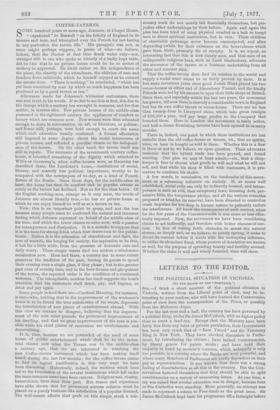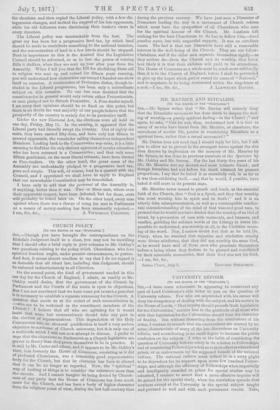LETTERS TO THE EDITOR.
THE POLITICAL SITUATION IN VICTORIA. [TO VIE EDITOB Or THE " SPEOTATOR.1 think a short account of the political situation in Victoria, written from the Liberal point of view, may be in- teresting to your readers, who will have learned the Conservative point of view from the correspondent of the Times, or possibly from the Melbourne Argus, For the last year and a half, the country has been governed by a political Ring, under Sir James McCulloch, with no higher policy than to avert a land-tax. Except that the Ministry have been fairly free from any taint of private peculation, their Government has been very much that of " Boss Tweed" and the Tammany Ring in New York. They have checked discussion in Parlia- ment, by introducing the cloture ; have bribed constituencies, by liberal grants for public works ; and have held their majority in hand by monetary coercion, which unhappily is only too possible, in a country where the Banks aro very powerful, and where many Members of Parliament are partly dependent on their pay as representatives. It was known that there was a strong feeling of dissatisfaction at all this in the country. But the Con- servatives flattered themselves that they should be able to split constituencies on a variety of unmeaning issues. At one time, a cry was raised that secular education was in danger, because four or five Catholics were standing. More generally, an attempt was made to represent a return to Free-trade as the great issue. Sir James McCulloch kept back his programme till a fortnight before
the elections, and then copied the Liberal policy, with a few dis- ingenuous changes, and invited the support of his late opponents, while his old followers were disclaiming their leader's views in every direction. The Liberal policy was unmistakable from the first. The great cry has been for a progressive land-tax, by which land should be made to contribute something to the national taxation, and the concentration of land in a few hands should be stopped. Next in importance to this is the demand that the Legislative Council should be reformed, so as to lose the power of vetoing Bills it dislikes, when they are sent up year after year from the Assembly. When I tell you that the Bill for abolishing State aid to religion was sent up and vetoed for fifteen years running, you will understand how obstructive our second Chamber can show itself on occasion. A continuance of Protective duties, though in- cluded in the Liberal programme, has been only a subordinate subject on this occasion. No one has ever doubted that the constituencies in general would only return either Protectionists, or men pledged not to disturb Protection. A Free-trader myself, I am sorry that opinions should be so fixed on this point, but there is no doubt the vast majority of our people believe that the ,prosperity of the country is mainly duo to its protective tariff.
Under the new Electoral Act, the elections were all held on one day, Friday, May 11. In the evening, it appeared that the Liberal party had literally swept the country. Out of eighty-six seats, they have carried fifty-four, and have only lost fifteen to avowed opponents, the remainder calling themselves independent Members. Looking back to the Conservative war-cries, it is a little amusing to finclthat the only distinct opponent of secular education who has been returned is a Conservative ; and that only some fifteen gentlemen, on the most liberal estimate, have been elected as Free-traders. On the other hand, the great mass of the Assembly are undoubtedly pledged to a progressive land tax, pure and simple. This will, of course, lead to a quarrel with the Council, and I apprehend we shall have to apply to England that our unworkable Constitution may be remodelled, I have only to add that the personnel of the Assembly is, if anything, better than it was. Two or three men, whom even their opponents respect, have been defeated, but for these, seats will probably be found later on. On the other hand, every man against whom there was a charge of using his seat in Parliament as a means of money-making has been summarily rejected.—



































 Previous page
Previous page